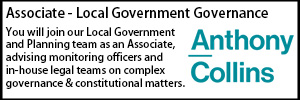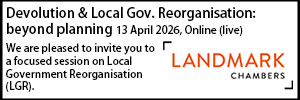Lessons to be learned from ‘that’ council meeting
- Details
John Pugh-Smith seeks to embrace some of the legal issues that arose out of the infamous remote meeting of a committee at Handforth Parish Council.
Described in the media as the worst-ever “Zoom meeting” the release of the footage on 4th February 2021 of the embattled Handford Parish Council’s deliberations on 10th December 2020 introduced a moment of bizarre “Lockdown laughter”, a claimed global sensation [1], as well as a “new normal” for how bad it can get. The attention on the common sense and perseverance of the “moderator”, Jackie Weaver, also introduced a new, quintessentially modest, national figure in the same week that the Country paid its respects to Captain Sir Tom Moore (dec’d). Nonetheless, while providing a fresh democratic benchmark, remarked upon even in the House of Commons, the Parish Council’s Meeting exposes a number of legal issues that are of wider consideration and reflection.
The Factual Context
Prior to its recent notoriety Handforth's claim to fame was being home to one of Britain's biggest M&S superstores and its proximity to Manchester Airport. It lies to the north of Wilmslow. The village, 'a fast-growing community connecting Cheshire to Greater Manchester’, ‘is also surrounded by villages inhabited by millionaire footballers’ known as “the golden triangle” [2]. Formed in May 2011 Handforth Parish Council has consisted of seven councillors representing three wards. In addition the Council holds committee meetings dealing with specific areas, Finance, Employment and Planning & Environment [3].
Cheshire East has also been a planning battleground for several years since the National Planning Policy Framework introduced fresh emphasis on a five-year housing land supply in 2012 [4], and, the encouragement of Neighbourhood Development Plans (NDPs), including for Handforth, by the then Planning Minister [5]. Accordingly, it is, perhaps, unsurprising that tensions have been rising, according to subsequently released footage from 2017, amongst the Parish Councillors. The row started several months beforehand between two warring camps with four on one side and three on the other. One councillor, Jean Thompson, ceased to be a member as she had not attended meetings for six months [6], leaving a split with three councillors on each side: Brian Tolver, Aled Brewerton and Barry Burkhill versus John Smith, Cynthia Samson and Susan Moore. However, it was the continuing failure of the Chairman, Brian Tovey, to attend for six months because he did not consider them to be legitimate, that led to the December “showdown” as to who, in effect ran the Parish Council. At the request of two councillors from one faction Jackie Weaver, Chief Officer of the Cheshire Association of Local Councils, was asked to” host” the extraordinary meeting. It was also the second time Mr Tolver was acting as “the chair” having previously been evicted from the earlier 7pm Planning and Environment committee call.
At the 7.30pm extraordinary meeting, Mr Tolver tells Ms Weaver to "stop talking", and added: "You have no authority here." In response, Ms Weaver removes Mr Tolver from the Zoom call and places him in a virtual waiting room. After Mr Tolver’s 'eviction', his ally Councillor Aled Brewerton is shown angrily shouting at Ms Weaver when she tries to elect a new chairman: "No they can't because the vice chair is here! I take charge! Read the standing orders. Read them and understand them!". An irate Mr Brewerton then yells off camera: "We're trying to have a Teams meeting you fool!" He was also later ejected. At this stage, it also needs to be noted that the row had come weeks after another brutal meeting where Ms Weaver had ejected Mr Tolver from the Zoom call. The meeting then resumes with a new elected chairman (from the other faction), Cllr John Smith wearily saying "Welcome to Handforth", to which Ms Weaver responds: "It's nothing if not lively".
According to a recent news item in Local Government Lawyer [7] Cheshire East had already received a ‘multiplicity of complaints’ regarding the conduct and behaviour of the Parish Council before the Zoom recording went “viral”. These had ranged from multiple complaints about councillors’ behaviour; to fundamental issues of governance and member/officer engagement. A reminder of misfeasance in public office, and, the elements of the offence [8] had also been given by Cheshire East’s Director of Governance & Compliance and Monitoring Officer. He had also advised that the Parish Council, or any individual councillor, "may seek advice and assistance from the local association of Town and Parish Councils for help with any potential issue and to seek advice to resolve the difficulties that have been reported. Given the high volume of complaints received, significant scrutiny of the parish council’s actions is likely" [9].
The Legal Context [10]
In England, there are 10,000 parish and town councils in England, with around 100,000 councillors. Their main responsibilities involve what are sometimes called “hyper-local services”, such as hedge trimming, maintaining local benches, public clocks, parish halls and some public toilets. While they can make representations on planning matters to the relevant district or borough council, which have to be considered, they cannot make decisions themselves on planning matters save in the formulation of a NDP.
A parish council [11] must in every year hold an annual meeting and at least three other meetings. A community council must hold the annual meeting and “such other meetings” as the council may determine. [12] A meeting of the council may be held either within or without the council’s area but must not be held in premises which at the time of such a meeting may be used for the supply of alcohol under the provisions of the Licensing Act 2003, unless no other suitable room is available either free of charge or at a reasonable cost. [13] The use of remote meetings, by Zoom or Microsoft Teams, has been permitted during the Pandemic. [14]
The chairman must be elected annually from among the councillors. [15] The first business at the annual meeting of the parish council is the election of the chairman. [16] The chairman, unless he resigns or becomes disqualified, continues in office until his successor becomes entitled to act as chairman. [17]
The council may appoint another councillor to be vice-chairman of the council. [18] The vice-chairman, unless he resigns or becomes disqualified, holds office until immediately after the election of a chairman at the next annual meeting of the council. [19] Subject to any standing orders made by the parish council, anything authorised or required to be done by, to or before the chairman may be done by, to or before the vice-chairman. [20] During their terms of office, the chairman and vice-chairman continue to be members of the council, notwithstanding the provisions relating to the retirement of parish councillors. [21]
Notice of parish council meetings must be given publicly by affixing a notice in some conspicuous place, [22] and individually by leaving at or sending by post to his usual place of residence a summons to each member. [23] Three clear days’ notice is necessary. Want of service of the notice does not affect the validity of the meeting. [24] The summons to each member must specify the business proposed to be transacted, and be signed by the proper officer of the council.
The chairman may call an extraordinary meeting of the council at any time. [25] If that chairman refuses after a requisition for that purpose signed by two members of the council has been presented to him/her, or, if without so refusing the chairman does not call a meeting within seven days after such a requisition, then any two members of the council, on that refusal or on the expiration of those seven days, as the case may be, may forthwith convene an extraordinary meeting of the council. [26]
At a meeting of a parish council the chairman, if present, or in his absence the vice-chairman, presides. Should both the chairman and the vice-chairman be absent, then such councillor as the members of the council present choose presides. [27]
No business can be transacted at a parish council meeting unless at least one-third of the whole number of councillors is present, provided that in no case can the quorum be less than three members. [28] If more than one-third of the members is disqualified, the quorum is calculated in relation to those remaining qualified, subject to there being a minimum of three. [29]
The mode of voting at meetings is by show of hands, unless the parish council’s standing orders otherwise provide, and on the requisition of any member of the council the voting on any question must be recorded so as to show whether each member present and voting gave his vote for or against that question. [30] If there is an equality of votes, the person presiding has a second or casting vote. [31]
Standing orders may allow a period of time to be set aside at each council meeting for questions by members of the public.
The parish clerk is the “proper officer” of the parish council [32] and as such is under a statutory duty to carry out all the functions of that local government office holder, and in particular to serve or issue all the notifications required by law. The parish clerk is responsible for ensuring that the instructions of the council in connection with its function as a parish council are carried out. They are expected to advise councillors on, and assist in the formation of, overall policies to be followed in respect of the council’s activities, and in particular, to produce all the information required for making effective decisions and to implement constructively all decisions. The clerk is also the “responsible financial officer” and accountable for all financial records of the Council and the proper administration of its finances.
The clerk is accountable to the council for the effective management of all its resources and must report to them as and when required. Because of the complexity of modern local government and volume of relevant material most parish councils now appoint a paid, and, experienced parish clerk. They are “an independent and objective servant” who take their instructions from the council as a corporate body and must recognise that the council is responsible for its decisions [33]. Their expertise can be invaluable particularly on practice and procedure for meetings as well as acting as a conduit for correspondence; and much of what the parish clerk does is simply based on good practice as well as common sense [34]. In an emergency (for example to cover a temporary vacancy) a councillor can fulfil the role of clerk but cannot receive payment and cannot take up such a new role until they have been resigned from the elected position for at least 12 months [35]
Discussion
While knowledge of the granular detail of the Handforth situation is not essential, given the exceptional nature of the events, what becomes clear is that this was a particularly egregious example of what can happen when matters get out of hand. Here, it seems that Jackie Weaver really acted as an umpire, having failed as a mediator; and even if she had been the “proper officer” the role of parish clerk, like the constitutional monarch, is to counsel and advise rather than dictate. Indeed, it has been suggested that even her preferred method of controlling a meeting could only have worked as it was held online [36].
As a nation, we have a tendency to sentimentalise the local and the amateur [37]. Furthermore, as the lowest tier of local government, there is an expectation that its financial drawdown through the annual precept will be commensurately modest; and yet the role and function of the 10,000 parish and town councils differs significantly, as reflected, for example, in the planning aspirations of some NDPs and their hyper-local policies [38]. Likewise, with their administrative requirements through the parish clerk, and, despite the recommended pay scales suggested by the Society of Local Council Clerks [39], all too often it is a case of either lack of sufficient awareness and/or available funds that can lead to a parish clerk’s hours or role to be too inadequate to ensure the “proper discharge” of their duties, and, thereby the function of the parish council.
Given that the upper tier district or borough council has governance oversight of a parish council, recourse should always be sought sooner, whether through its Monitoring Officer or another higher officer, than later if its affairs are becoming out of hand. Accordingly, if meetings are not taking place even during the Pandemic, or, there is a pattern of feuding, then a particular level of enquiry, scrutiny and direction should be activated and swiftly. While parish councils cannot be formally placed into “special measures”, so far as I am aware, that effect should be initiated. Otherwise, while threatened, actual cases of misconduct [40] or misfeasance [41] in public office are rare, no doubt due to this area of law being somewhat complicated and extreme [42].
Conclusion
While it may have captured the attention of the wider Lockdown weary, the fact remains that there are unresolved governance issues which only through the re-opening of the ballot box in May 2021 may lead to better stories and outcomes in Handforth Parish after the “Zoom Massacre” [43]. Let’s hope so for the sake of local government.
John Pugh-Smith is the Joint General Editor of Shackleton on the Law and Practice of Meetings. The production of this practitioner work, now into its latest 15th Edition (2020) received assistance from a 39 Essex Chambers team comprising Tom Tabori (Assistant Editor) and James Burton, Jon Darby, Gethin Thomas and Nicholas Higgs (Chapter Editors). He has also recently been co-opted as a parish councillor and elected as vice-chairman of his village parish council. He also thanks Luisa Cantera of Norfolk Parish Training & Support and Maxine Hayes, Locum Parish Clerk for their reading of the draft article though the views expressed remain his own.
[2] https://www.dailymail.co.uk/news/article-9227485/Jackie-Weaver-admits-DOESNT-KNOW-authority-chaotic-Handforth-Parish-Council.html
[3] https://www.handforth.org.uk/index.php
[4] See e.g. CHESHIRE EAST COUNCIL v (1) SECRETARY OF STATE FOR HOUSING, COMMUNITIES & LOCAL GOVERNMENT (2) GRAHAM KIRKHAM (3) ANGELA MARY KIRKHAM [2018] EWHC 2906 (Admin)
[5] Then Rt Hon Nick Boles MP: Neighbourhood planning - GOV.UK (www.gov.uk) (Ministerial Statement 10.07.2014)
[6] Presumably her apologies for absence (if any) had not been accepted by the other Councillors
[7] February 8th, 2021: localgovernmentlawyer.co.uk/governance/396-governance-news/46108-parish-council-that-went-viral-over-committee-meeting-is-subject-of-multiplicity-of-complaints
[8] Attorney General's Reference No 3 of 2003 [2004] EWCA Crim 868
[9] https://www.handforth.org.uk/index.php
[10] See Chapter 28 of Shackleton on the Law and Practice of Meetings 15th Edn. (2020): https://www.sweetandmaxwell.co.uk/Product/Company-Law/Shackleton-on-the-Law-and-Practice-of-Meetings/Hardback-and-eBook-ProView/42804837
[11] Local Government Act 1972, Sch.12 para 7(1), In this chapter, unless the context otherwise requires, the term “parish council” or “council” should be read as applying equally to a community council in Wales.
[12] Schedule 12 paras 23(1), 24(1).
[13] Schedule 12 paras 10(1), 26(1) (as amended). See also s.134 as to the use of a schoolroom or other room maintainable out of any rate.
[14] Section 78(1)(d) of the Coronavirus Act 2020 provides that the relevant national authority may, by regulations, make provision relating to the manner in which persons may attend, speak at, vote in, or otherwise participate in, local authority meetings. Section 78(2) continues that this includes “provision for persons to attend, speak at, vote in, or otherwise participate in, local authority meetings without all of the persons, or without any of the persons, being together in the same place”. On the basis of s. 78 the Government published the Local Authorities and Police and Crime Panels (Coronavirus) (Flexibility of Local Authority and Police and Crime Panel Meetings) (England and Wales) Regulations 2020 (the “CV Regulations”), which came into force on 4 April 2020, and apply to all local authorities in England and police and crime panels in England and Wales. They are subject to a sunset provision applying them to meetings held, or required to be held, before 7 May 2021[14]
[15] Sections.15(1), and 34(1). From a date to be appointed, the chairman of a parish council can only be appointed from amongst the elected councillors: s.76(1) of the 2007 Act.
[16] Sections 15(2), and 34(2).
[17] Sections 15(4), and 34(4).
[18] Sections 15(6), and 34(6).
[19] Sections 15(7), and 34(7).
[20] Sections 15(9), and 34(9).
[21] Sections 15(8), and 34(8).
[22] Schedule 12 paras 10(2)(a), 26(2)(a). See West Ham Corp v Thomas (1908) 73 J.P. 65.
[23] Schedule 12 paras 10(2)(b), 26(2)(b).
[24] Schedule 12 paras 10(3), 26(3). For “clear days” see para.5-10.
[25] Schedule 12 paras 9(1), 25(1).
[26] Schedule 12 paras 9(2), 25(2).
[27] Schedule.12 paras 11, 27.
[28] Schedule 12 paras 12, 28.
[29] Schedule 12 para.45.
[30] Schedule 12 paras 13, 29.
[31] Schedule 12 para.39(2).
[32] Section 112 (1) of the Local Government Act 1972
[33] Part 2: Governance Toolkit – …ask your council
[34] SLCC | The 2019 edition of The Clerks Manual has landed!
[35] Sections 112(5) & 116 of the LGA 1972
[36] David Aaronovitch, The Times, 11th February 2021
[37] Ditto
[38] See e.g. R (Lochailort Investments Ltd) V Mendip DC & Norton St Philip PC [2020] EWCA Civ 1259: An absence of any reasoned justification by the Parish Council and its NDP Examiner for a local green space which was more restrictive than national green belt policy, was held to be unlawful.
[39] https://www.slcc.co.uk/ Founded in 1972, the SLCC is the professional body for local council clerks and senior council employee. It represents clerks to over 5,000 councils in England and Wales.
[40] https://www.cps.gov.uk/legal-guidance/misconduct-public-office
[41] https://www.lawcom.gov.uk/app/uploads/2016/01/apb_tort.pdf
[42] https://www.localgovernmentlawyer.co.uk/employment/312-employment-features/38375-the-need-to-plead
[43] David Aronovitch, The Times, 11th February 2021
Legal Director - Government and Public Sector
Head of Legal Services / Deputy Monitoring Officer
Locums
Poll

















